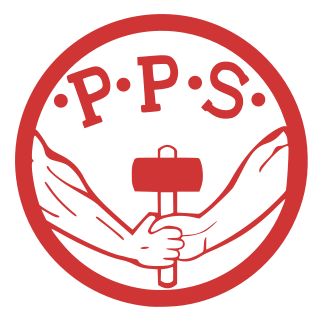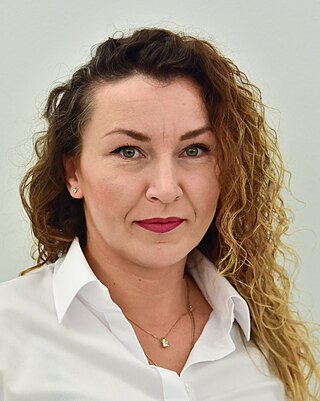The Polish People's Party is an agrarian political party in Poland. It is currently led by Władysław Kosiniak-Kamysz.

Count Stanisław Małachowski, of the Nałęcz coat-of-arms was a Polish statesman, the first Prime Minister of Poland, a member of the Polish government's Permanent Council (1776–1780), Marshal of the Crown Courts of Justice from 1774, Crown Grand Referendary (1780–1792) and Marshal of the Four-Year Sejm (1788–1792).

The Polish Socialist Party is a democratic socialist political party in Poland.

The Polish Mathematical Society is the main professional society of Polish mathematicians and represents Polish mathematics within the European Mathematical Society (EMS) and the International Mathematical Union (IMU).

Stanisław Skalski, was a Polish aviator and fighter ace who served with the Polish Air Force and British Royal Air Force during the Second World War. Skalski was the top Polish fighter ace of the war and chronologically the first Allied fighter ace of the war, credited, according to the Bajan's list, with 18 11/12 victories and two probable. Some sources, including Skalski himself, give a number of 22 11/12 victories.

Polish 1st Legions Infantry Division is a tactical formation of the Polish Army. Formed on February 20, 1919, partially of veterans of the I Brigade of the Polish Legions, the unit saw extensive action during the Polish-Soviet War and World War II. Regarded by the soldiers of the Wehrmacht as the Iron Division, it distinguished itself in the Invasion of Poland.

Joachim Stanisław Brudziński is a Polish conservative politician. He was elected to the Sejm on 25 September 2005, getting 14,731 votes in 41 Szczecin district as a candidate from the Prawo i Sprawiedliwość list. Brudziński graduated from the political sciences faculty of the University of Szczecin. Sailor, journalist and PhD student of the University of Poznań. Presently president of executive committee of the ruling party Law and Justice, he is well known for his "down to earth" and family oriented perspectives of global politics.

Mariusz Kamiński is a Polish politician who served as the head of the Central Anticorruption Bureau (CBA) from August 2006 to October 2009. He served between 2019 and 2023 as the Minister of the Interior and Administration, in addition to coordinating Polish secret services, which he had done previously as a minister without portfolio. Kamiński also served as a member of the Sejm.

Mariusz Stanisław Fyrstenberg is a retired Polish tennis player who was a doubles specialist.

The Bydgoszcz events – also referred to as the Bydgoszcz crisis, or the Bydgoszcz provocation – were a series of events in Poland culminating in the beatings of delegates of the Solidarity movement by the forces called upon by the authorities during the session of the voivodship National Council on 19 March 1981, which was to discuss the running strike in Bydgoszcz.

Mariusz Błaszczak is a Polish politician, historian, and local government representative. Błaszczak has served as Minister of National Defence of Poland from 2018 to 2023.

Franciszek Jerzy Stefaniuk is a Polish politician of the agrarian Polish People's Party, who served as a Sejm member from the Contract Sejm (1989) until 2015, representing Chełm. He was re-elected for his eight term in October 2011, winning 10,527 votes. Four years later he failed to secure a ninth term.

Stanisław Kazimierz Dąmbski was a politically powerful Polish prelate and king-maker. He was in turn, bishop of Chełm, Łuck, Płock, Kujawy and finally, bishop of Krakow.
The improved Grom-class destroyers of 1939 were the third and fourth planned ships of the Grom class of destroyers ordered for the Polish Navy shortly before World War II. They were to be built in Poland, the first destroyers so constructed, and were to be named Huragan ("hurricane") and Orkan ("windstorm"), respectively. Their design included greater power and displacement than the first two ships of the class. Their construction was interrupted by the beginning of World War II and they were never completed.
Wagabunda was a Polish satirical theatre (cabaret) from 1956 to 1968, created by actress Lidia Wysocka and Karol Szpalski.

The Sankt Florian Psalter or Saint Florian Psalter is a brightly illuminated trilingual manuscript psalter, written between late 14th and early 15th centuries in Latin, Polish and German. The Polish text is the oldest known translation of the Book of Psalms into that language. Its author, first owners, and place of origin are still not certain. It was named after St. Florian Monastery in Sankt Florian, a town in Austria, where it was discovered.

The Polish People's Party – Peasants' Agreement, commonly known simply as Peasants' Agreement (PL), was an agrarian and Christian-democratic political party in Poland.

The Agreement, formally known as Jarosław Gowin's Agreement, is a centre-right political party in Poland.

Monika Jolanta Pawłowska is a Polish politician.
The Borderlands Poles, also known as the Borderlands groups, is a term for the collection of the ethnographic groups of Polish people from the area of the Eastern Borderlands, an area to the east of modern borders of Poland, within the modern territory of Belarus, Lithuania, Ukraine. They are mostly descendants of Masovians, and to lesser extend, Lesser Poland people, who colonized the area across centuries. The groups aren't directly connected, having different origins, and developing separately. However, they are categorized together, due to the shared factor of devolving on the eastern boundaries of Polish population, influenced by the other ethnic groups located to the east. In the aftermath of World War II, they were displaced from the Soviet Union to Poland, mostly in the first repatriation of 1944–1946, and later in the second repatriation of 1955–1959. As such, they, and their descendants, now live across Poland. Such people are also known as the Bug River Poles.
















